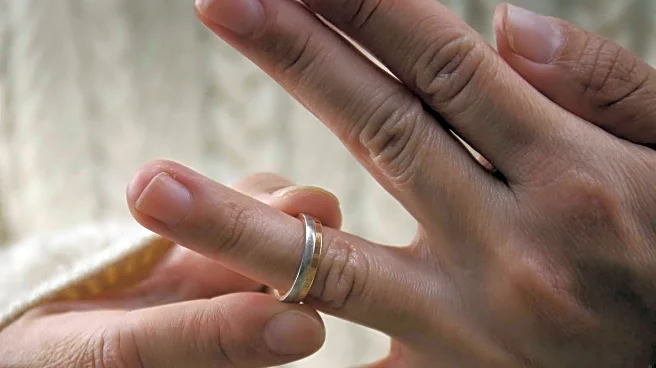What's Happening?
A woman has come to the realization that her husband frequently negates her statements, a habit that has become a source of emotional discomfort. This issue was highlighted in a column by Carolyn Hax,
where the woman describes how her husband often refutes or dismisses her comments, regardless of their validity. This pattern of behavior has led her to feel constantly undermined and invalidated. The woman shared specific instances, such as her husband denying her observations about new neighbors despite her firsthand interactions. This realization has prompted her to seek advice on how to address this recurring issue in her marriage.
Why It's Important?
The situation underscores a broader societal issue where women's voices are often dismissed or undermined, reflecting a pattern that can have significant emotional and psychological impacts. In relationships, such behavior can lead to a breakdown in communication and trust, potentially affecting the overall health of the partnership. The woman's experience is a microcosm of a larger cultural dynamic where women's contributions are frequently minimized, which can perpetuate gender inequality. Addressing such issues is crucial for fostering healthier interpersonal relationships and promoting gender equity.
What's Next?
The woman is advised to confront the issue directly with her husband, emphasizing the need for mutual respect and validation in their communication. This may involve setting boundaries and seeking professional guidance, such as couples counseling, to address the underlying dynamics. The situation also calls for broader awareness and reflection on communication habits, encouraging individuals to be more mindful of how they engage with their partners. If unresolved, the issue could escalate, potentially leading to more significant relationship challenges.
Beyond the Headlines
This case highlights the importance of recognizing and challenging ingrained communication patterns that can perpetuate gender biases. It also raises questions about the role of societal norms in shaping interpersonal dynamics and the need for cultural shifts towards more equitable interactions. The woman's experience serves as a reminder of the importance of self-awareness and the willingness to address uncomfortable truths in pursuit of healthier relationships.









